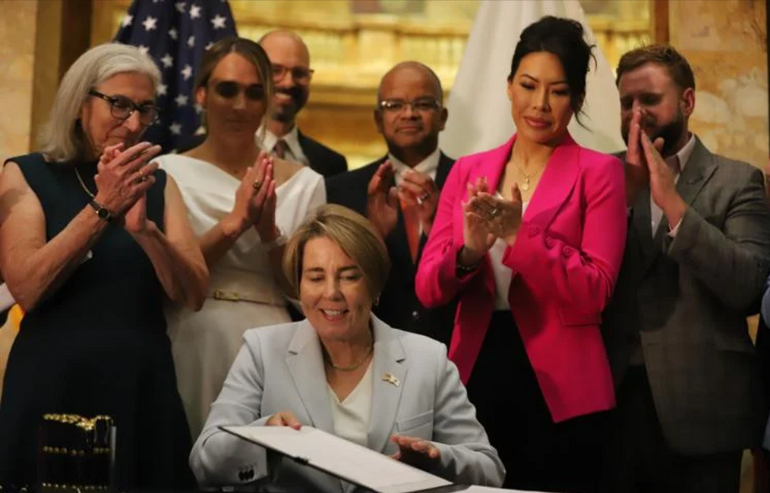Healey signs legislation expanding transgender care, reproductive protections
 Photo | Courtesy of Ella Adams, State House News Service
Gov. Maura Healey, flanked by advocates, lawmakers and others, signs the 2025 "shield" bill into law at the State House on Thursday.
Photo | Courtesy of Ella Adams, State House News Service
Gov. Maura Healey, flanked by advocates, lawmakers and others, signs the 2025 "shield" bill into law at the State House on Thursday.
Surrounded by health care advocates and curious tourists peering into Nurses Hall, Gov. Maura Healey signed an expanded shield law Thursday giving patients and providers in Massachusetts a new layer of defense against out-of-state intrusion into reproductive and transgender care.
"No one is going to come to Massachusetts and attack our people, attack our institutions, attack our providers because we believe in freedom," Healey said. "It's why we've continued, collectively, to take action, and we will continue to take action as necessary. We owe it to the people of Massachusetts. And you know what? We owe it to Americans. We owe it to this country."
Attendees at the bill-signing ceremony represented Planned Parenthood League of Massachusetts, Reproductive Equity Now, ACLU Massachusetts, GLBTQ Legal Advocates and Defenders, Fenway Health, Health Imperatives, Brigham and Women's Hospital and the Massachusetts Medical Society, among others.
At a time of enhanced federal scrutiny and legal threats largely led by Republicans in other states, lawmakers last week moved to update the 2022 shield law intended to protect providers and patients of reproductive care, including abortions, and transgender care. Supporters say additional steps are needed to plug gaps in existing law in the wake of the U.S. Supreme Court decision overturning Roe v. Wade.
The expanded shield law limits the release of sensitive data, allows prescription labels to display a practice name instead of an individual physician's name, and codifies a state requirement for abortion care to be provided in emergencies when medically necessary. The anonymity provision for prescription labels is linked to the case of a doctor in New York -- which has a shield law -- who's faced a felony charge in Louisiana and a hefty penalty in Texas for providing abortion medication.
The law also blocks courts here from considering or admitting cases of abuse, neglect or maltreatment for parents who support their children in receiving transgender care.
"It's a true honor today to celebrate a law that will save lives, including my own, and so many other trans people who I know," said Dallas Ducar, who's transgender and is Fenway Health's executive vice president of donor engagement and external relations. "This will save families, will protect families, and remind our country what leadership looks like."
In a statement to the News Service, the Massachusetts Family Institute warned about the law's impact on children.
"Governor Healey and Massachusetts legislators have sadly, but predictably, bowed to ideology instead of protecting Massachusetts citizens, especially children," MFI general counsel Sam Whiting said. "This 'shield law' only shields activist healthcare providers from transparency and accountability, all while infringing on the rights of other states to protect children from abortion and irreversible gender mutilation procedures."
Healey called the law a "necessary step forward," as she invoked the gravity of the week, which brought Texas Democratic lawmakers to Beacon Hill twice to amplify their resistance to efforts in their state to redraw congressional districts to favor Republicans. Similar to how those Texas Democrats say they are fighting to protect voting rights nationwide, Healey signaled Massachusetts Democrats are taking a similar approach to "reproductive rights."
"What we do to protect people's rights here in Massachusetts impacts the country," Healey said.
House Judiciary Committee Chair Michael Day said last week that the urgency of the effort to update the shield law "has been dictated by the wild rhetoric as well as the acts taken by both this presidential administration, as well as several of our sister states, in the field that this bill covers: the right for a woman to control her body and the right for transgender individuals to be treated as equals here in the commonwealth."
In New Hampshire last week, Gov. Kelly Ayotte signed two bills banning transgender care for minors, including puberty blockers or hormone treatments, as well as chest surgeries, according to NHPR.
"Medical decisions made at a young age can carry lifelong consequences, and these bills represent a balanced, bipartisan effort to protect children," Ayotte said in a statement.
About 40% of transgender youth across the country -- or roughly 120,400 individuals -- live in 27 states that have bans on gender identity care, according to the Human Rights Campaign.
Georgia's six-week abortion made national headlines this summer, after a pregnant woman who had been declared brain-dead was kept on life support for months until her baby was delivered via an emergency C-section.
In Missouri, a trial is slated for later this month surrounding the certification of a 2026 ballot initiative, based on a measure state lawmakers approved, to largely ban abortions with some exceptions, KOMU 8 reported. Just last November, Missouri voters approved a constitutional amendment to protect abortion access, after the state outlawed the procedure following the Supreme Court's Dobbs ruling, according to PBS News.
Forty-one states have some form of abortion bans, including 12 with total bans and 28 with bans based on gestational duration, according to the Guttmacher Institute, a research and policy organization focused on reproductive health care. Twenty-two states and Washington, D.C. also have shield protections for reproductive and transgender care.
Sen. Cindy Friedman, the Senate's point person on the original and expanded shield law, said the measure is "fundamentally about protecting our state from those outside who wish to decide how we in Massachusetts choose to deliver health care and the values we decide should drive that care."
"We sit down together and decide what our values are -- not Texas, not Missouri, not the federal government," Friedman said. "It's us here in Massachusetts. States across the nation have continued actually to look to us to see what we're doing to provide these vital protections."
Massachusetts Medical Society President Dr. Olivia Liao released a statement supporting the new law.
"The law provides critical protections for patients seeking and physicians delivering reproductive and gender-affirming care, responding to growing threats that seek to interfere with decisions that belong to patients and their doctors," Liao said. "Out-of-state legal actions seeking to criminalize care that is grounded in science, medical standards, and ethical practice have no place in the Commonwealth."













0 Comments